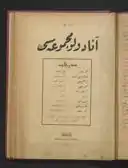Anadolu Mecmuası
Die osmanischsprachige Zeitschrift Anadolu Mecmuası (osmanisch: آنادولو مجموعهسى; İA: Ānādolu Mecmuʿası; deutsch: „Anatolien Zeitschrift“) erschien von 1924 bis 1925 in Istanbul in insgesamt 11 Ausgaben.
| Anadolu Mecmuası | |
|---|---|
 | |
| Fachgebiet | Kultur |
| Sprache | osmanisch-türkisch |
| Erstausgabe | 1924 |
| Einstellung | 1925 |
| Herausgeber | Hilmi Ziya Ülken |
| Weblink | Anadolu |
| ZDB | 305079-8 |
Sie wurde von Hilmi Ziya Ülken (1901–1974), einem Philosophen und Soziologieprofessor der Universität Istanbul und dem Historiker Mükrimin Halil Yinanç (1898–1961) herausgegeben.[1] Die Idee der Zeitschrift entstand aus einer intellektuellen Bewegung von Professoren und Studenten verschiedener Fachrichtungen („Anadoluculuk“), deren Hauptvertreter Yinanç war.[2] Die Zeitschrift diente der Verbreitung ihrer Ideen und als literarisches Forum, in dem über anatolische Themen, wie Folklore, Geschichte, Philosophie und Geographie, geschrieben wurde.[3] Der Begriff des „anatolischen Vaterlands“ sollte deutlich machen, dass dieses die Nation bestimme und die Geschichte der Republik Türkei als Geschichte Anatoliens betrachtet werden sollte.
Literatur
- Ran Boytner, Lynn Swartz Dodd, Bradley J. Parker: Controlling the Past, owning the Future: The Political Uses of Archaeology in the Middle East, Tucson 2010.
- Dirican, Rabia: Anadolu Mecmuasi’nin Türk Düşünce Hayati Açisindan Değerlendirilmesi, in: International Journal of Social Science, No. 25-I, 2014, S. 387–398.
- Dressler, Markus: Writing Religion: The Making of Turkish Alevi Islam, Oxford 2013.
- Gürpınar, Doğan: Ottoman/Turkish Visions of the Nation, 1860–1950, New York 2013.
Weblinks
- Online-Version: Anadolu
Einzelnachweise
- vgl. Anadolu Mecmuasi, 1. Ausgabe, 1924.
- vgl. Dirican, Rabia: Anadolu Mecmuasi’nin Türk Düşünce Hayati Açisindan Değerlendirilmesi, in: International Journal of Social Science, No. 25-I, 2014, S. 387–398. und Dressler, Markus: Writing Religion: The Making of Turkish Alevi Islam, Oxford 2013, S. 172.
- Ran Boytner, Lynn Swartz Dodd, Bradley J. Parker: Controlling the Past, owning the Future: The Political Uses of Archaeology in the Middle East, Tucson 2010, S. 78.